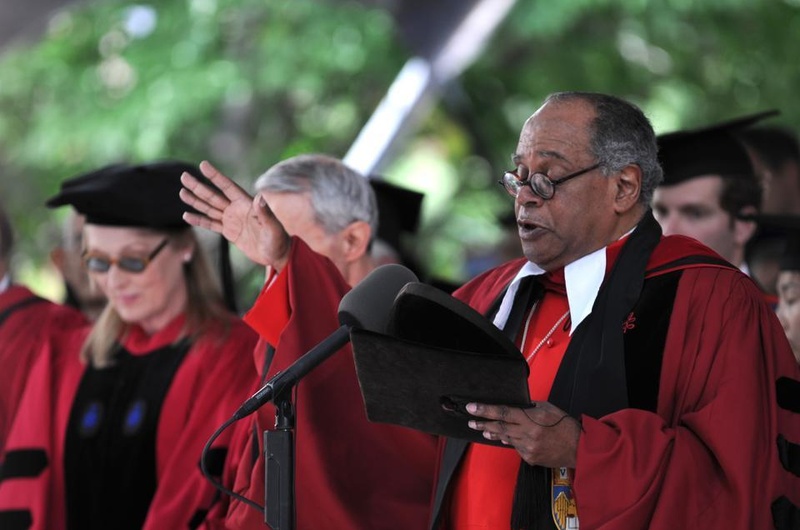The late Pusey Minister and Plummer Professor of Christian Moral Peter J. Gomes was an anomaly.
“An African-American from Plymouth, a Baptist in Memorial Church, a Republican in Cambridge, out-of-the-closet and out-of-the-box,” University President Drew G. Faust said during a eulogy for the late minister this April.
Gomes’ distinctiveness may make him the odd man out when grouped with his eight predecessors in the role of minister at Harvard. For many reasons, his appointment to the position 35 years ago certainly raised eyebrows.
But Gomes’ selection during the turbulent 1960s and 70s was an early indicator of the evolution that the University would undergo during Gomes’ long tenure. In his 35 years at the helm of the church, Gomes came to embody and define the Harvard of today—an eccentric, eclectic mixture of increasingly diverse individuals at the forefront of progress and learning.
Growing up in Plymouth, he was surrounded by history. As a child he would walk through the town’s local cemetery, recalling from memory the names of America’s oldest settlers on the headstones. In his later years, his time in Plymouth was often spent at the Old Colony Club, one of the oldest all-male social clubs in America, and the Pilgrim Society, where he once served as president.
“As an African American growing up in Plymouth he was of course a minority,” Harvard Divinity School Professor Emeritus Harvey G. Cox Jr. said. “It’s rather indicative of how Peter was able to absorb, in his own way, traditions that were not biologically his own and make them his own. His whole life he was so steeped in the history of his hometown.”
Gomes adapted to his position at Harvard in much the same way. When he entered Harvard Divinity School in 1965, the United States and the world of religion were seemingly influx. Protests against the Vietnam War began to coalesce around the country, the Civil Rights movement seemed to be gaining ground, and the influence of religion appeared to be on the decline.
“In the 1970s, when Gomes took over, it was the low point of religious life in the United States and certainly on college campuses,” said Jonathan C. Page ’02, a former Epps Fellow at Memorial Church.
While as an African American he may have been a remarkable choice to lead the church at Harvard, a University where the faculty was still dominated by white men, Gomes’ commitment to tradition and to Harvard made him a logical, if unusual, selection. His course “The History of Harvard and Its Presidents” remained popular with students at the College for years. He took pains to write a history of the Hollis professorship at Harvard Divinity School. When Cox wanted to graze a cow in Harvard Yard—a tradition that had been practiced by past holders of his endowed professorship—Gomes jumped on the opportunity to bring tradition back to life.
But, perhaps most significantly, Gomes was able to adapt traditions—giving them his own flair and allowing them to survive in a new era.
“I’ve given my life to Harvard, and I have a wonderful sense of the great continuity,” he said, reflecting on his career in an interview with The New Yorker. “I can see the Puritans sailing in, I can see Henry Dunster’s first Commencement, and the incredible thing is that I can see me in it!”
Viewing his career in retrospect, Gomes can perhaps be seen in the center of Harvard’s religious tradition. The ability to command a strong following with his sermons—solidly grounded in the Bible, but offering a different, more progressive interpretation—was a feat in itself that reflected his ability to merge the traditional with the contemporary.
“Many of us—when asked our denomination—continue to answer as Skip Gates once did: ‘We are Gomesians, sir,’” Kennedy School Professor and longtime member of the church’s congregation David R. Gergen said of Gomes’ traditional yet progressive Christianity.
This blend, along with his rhetorical abilities, maintained attendance at the church while the number of churchgoers declined at Protestant university churches across the country. And while Gomes’ role at Harvard extended beyond his preaching duties at Memorial Church, religion informed those functions and his everyday life.
“It was oftentimes hard to see Peter’s faith come through in his public persona at Harvard ... I was very struck that at the core of it all was this very strong Christian faith,” Page said. “The more you got to know him, the more you got to see that deep faith.”
Read more in News
Deal Making















